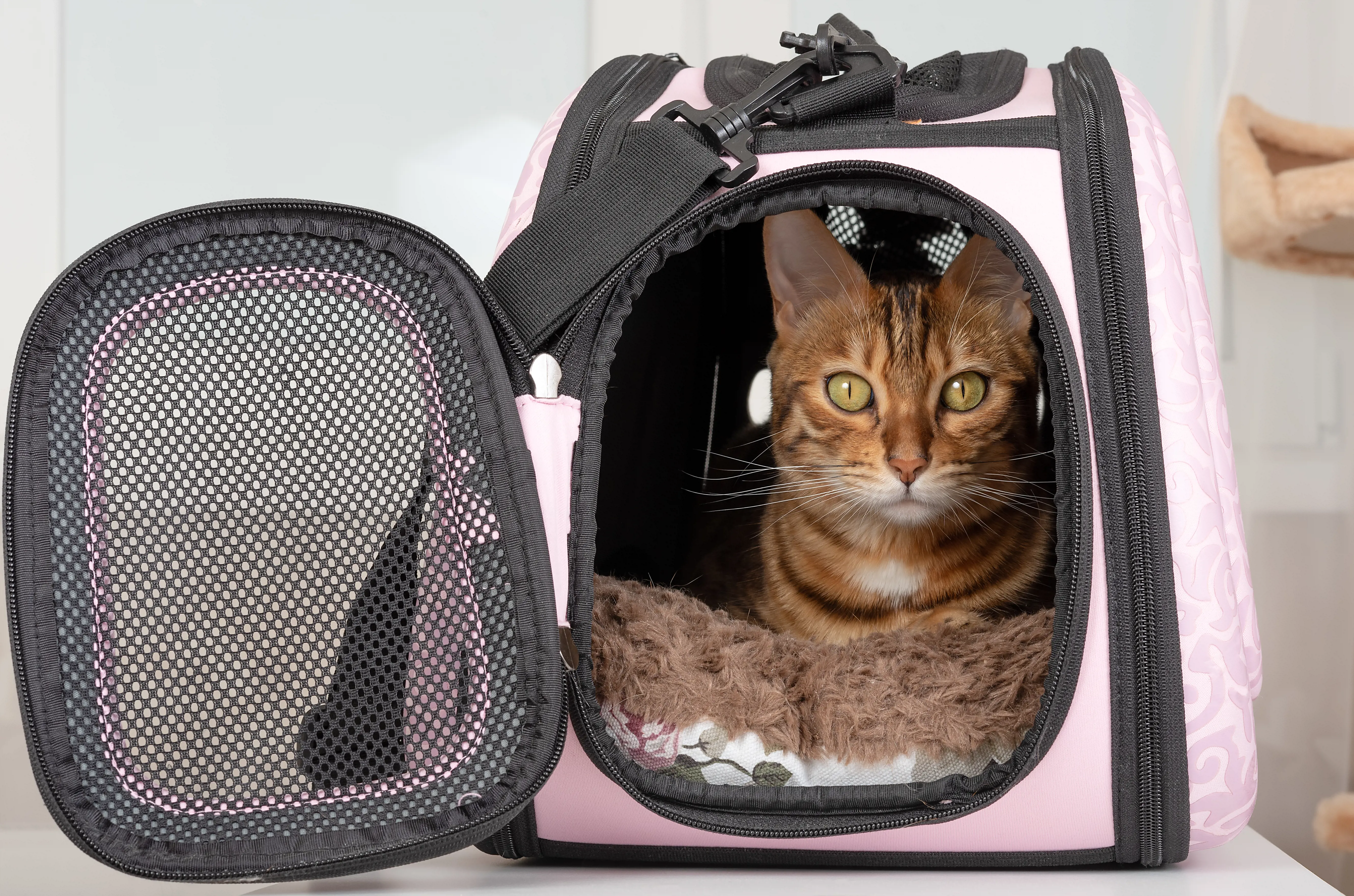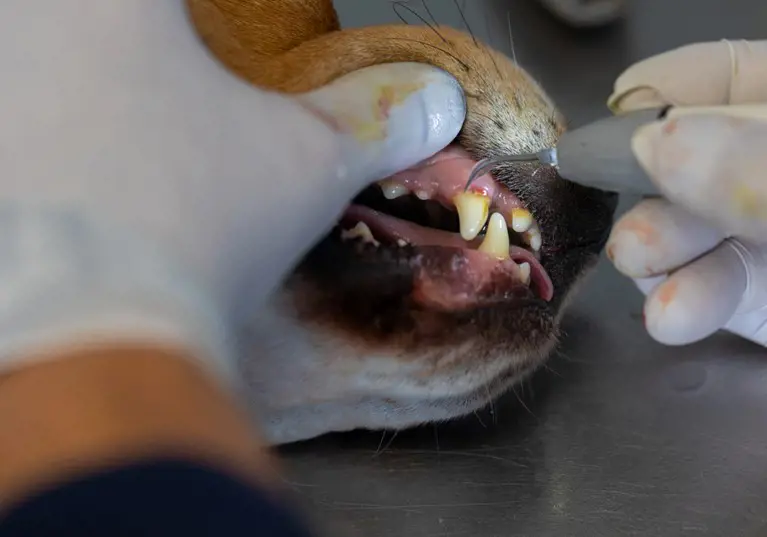How to stop your cat waking you up at night
31st May, 2022
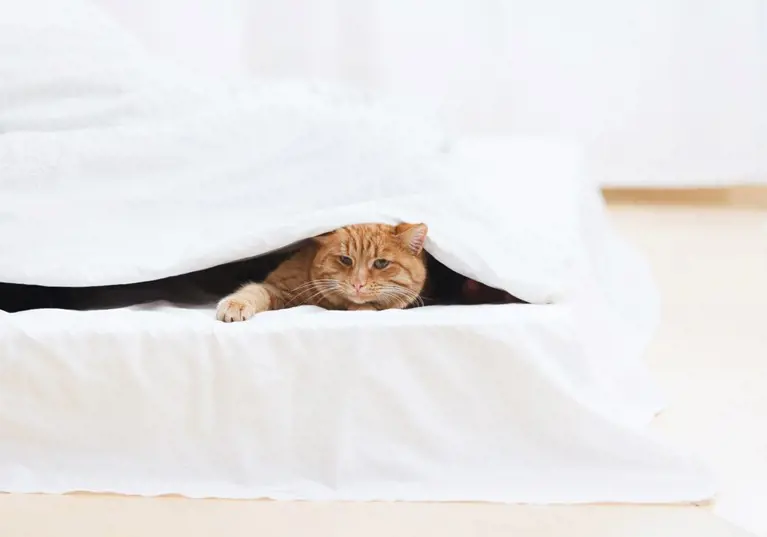
Ever had your slumber disturbed by an insistent ‘meow’? Or been startled awake in the early hours by your kitten’s claws piercing your toes?
Cats have little respect for their owners’ need for eight hours of uninterrupted shut-eye. When they want to eat, play or be cuddled, they’ll let you and your family know about it!
At Purely Pets, we know how important it is to cater to your pets’ needs, by protecting them with suitable cat insurance. But equally, it’s important for the human members of the household to get enough sleep!
So how do you catch your Zzzs while retaining harmonious feline-human relations in your home? And when should you be worried by your moggy’s night-time behaviour? Read on for our definitive guide.
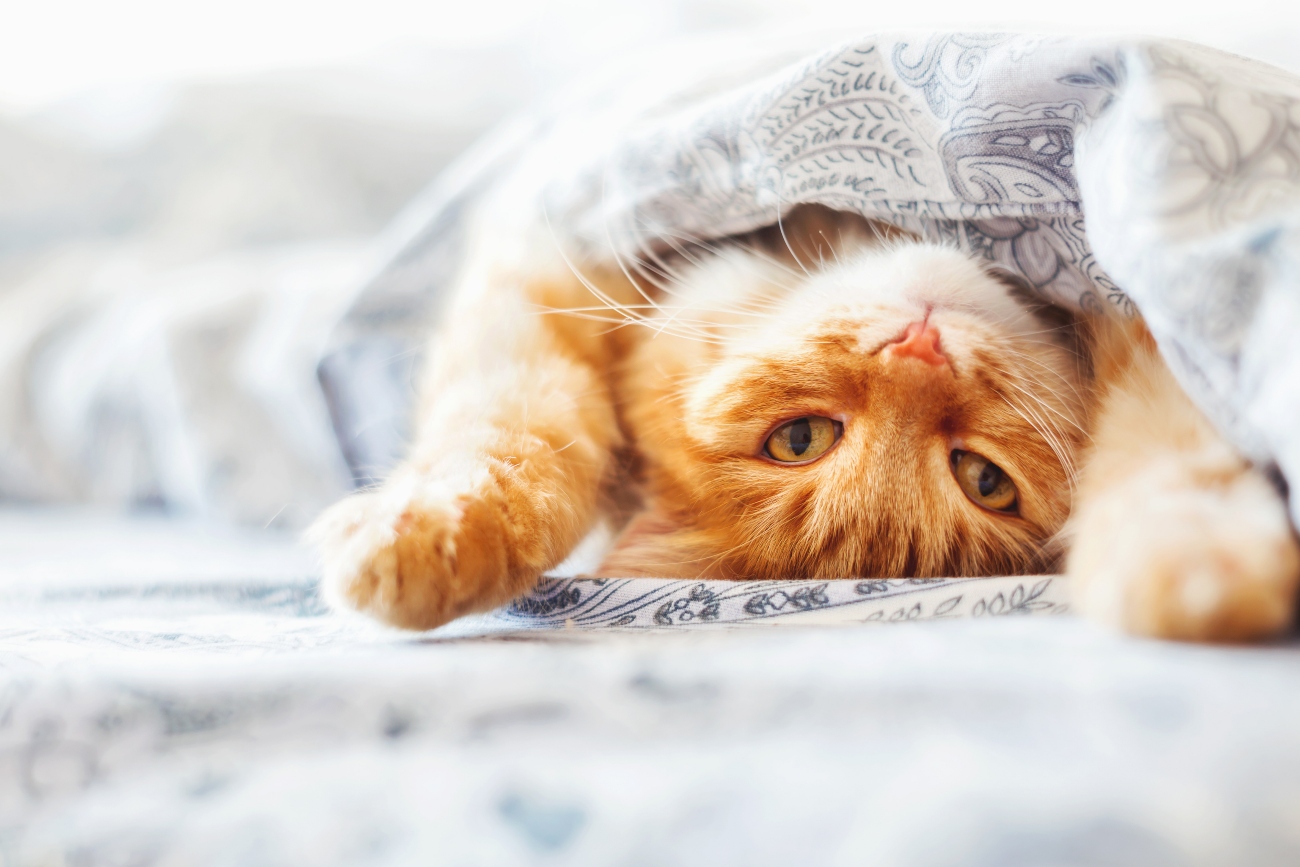
Chapter 1: Understand human sleeping habits
Chapter 2: Understand feline sleeping habits
Chapter 3: Should I be concerned that my cat is waking me?
Chapter 4: Should I let my cat out at night?
Chapter 5: Encourage good sleep habits by getting into a routine
Chapter 6: Make your cat tired by keeping it entertained during the day
Chapter 7: Enrich your cat’s life by getting it a companion
Chapter 8: Settle your cat’s stomach by changing its meal habits
Chapter 9: Keep your cat content by creating a cosy sleeping space
Chapter 10: Let your pet outside safely with a cat flap or catio
Chapter 11: Top tips for a peaceful night’s sleep for you and your moggy
Chapter 1: Understand human sleeping habits
First, it helps to understand circadian rhythms – the internal clocks that regulate how different species react to different times of the day and night.
Humans are naturally programmed to be diurnal: awake and active during the day, and in the land of nod when it’s dark.
Generally, adults need seven to nine hours of more-or-less uninterrupted sleep between around 11pm and 7am. And if we’re woken in the early hours, we struggle to get back to sleep.
While some people do well on a siesta or post-lunch snooze, many of us feel sluggish after a daytime nap. And if you live in a cooler country such as the UK, society is not structured around lengthy lunchtime breaks - your boss might be unsympathetic if you refuse to schedule meetings between midday and 3pm!
So if we’re woken at night, we have to power on through the day regardless of our low energy levels. That leads to low mood, poor concentration, and irritability. Longer term, lack of sleep can have significant health consequences, too.
All in all, if your cat is regularly preventing you from getting your rest, you need to take action fast!
Chapter 2: Understand feline sleeping habits
Sadly, feline sleeping habits don’t generally align with those of humans.
Cats’ circadian rhythm is crepuscular: they’re naturally programmed to snooze on and off throughout daylight hours, and be bright-eyed and bushy-tailed at dusk and dawn.
In the wild, or left to their own devices, cats will spend the twilight hours hunting, prowling around looking for a mate, and defending their territory.
That can lead to some ear-splitting caterwauling that wakes up not just you, but the entire neighbourhood!
Even if your pet is a silent assassin, all that night-time activity leaves them starving by the early hours. Come 4am, they’re ready for their breakfast and either a snooze on the sofa, or another hunting spree.
That highlights another advantage that kitties have over their owners: they tend to sleep in short stretches. Yes, cat naps are real!
In total, cats sleep between 12 and 18 hours in every 24-hour period – with kittens and senior moggies at the higher end of that scale.
If your cat sleeps more or less than that, it’s probably nothing to worry about – but with cat insurance from Purely Pets, you get access to a 24-Hour Vet Helpline to discuss your concerns.
Chapter 3: Should I be concerned that my cat is waking me?
As well as natural feline circadian rhythms, there might be health problems causing your cat to wake you at night. It’s wise to check these out before following our tips below – particularly if there’s been a recent change in your pet’s night-time behaviour.
A cat might start meowing at night due to pain or discomfort. Felines often mask injury and illness well – but increased nocturnal restlessness should lead you to suspect that something’s not quite right with your pet.
It could also be a sign of cognitive dysfunction. This is similar to dementia in humans, and is most common in older cats. Cats with cognitive dysfunction often start roaming and howling at night, as their normal rhythms become disturbed.
Sight or hearing problems are also possible underlying causes. A cat which develops sight problems will be less able to see in the dark, so might become confused and will meow to find you. If it is growing deaf, it might not be able to hear its own meow – so will increase the volume until it can!
Cats can also start meowing, wailing or becoming restless at night due to anxiety or stress. This might just settle down quickly – if your puss is reacting to guests staying overnight, or to a temporary change in the household routine. But it could be a sign of a longer term issue like a new pet or baby in the family.
So if your mog begins to become more disruptive than usual after-hours, it’s worth a trip to your vet to see if anything’s the matter. Cat insurance from Purely Pets will help you with the costs: you can choose from 15 levels of lifetime cover, with excess starting at just £60.
Have you ruled out all the above health conditions? Read on to find out what action to take.
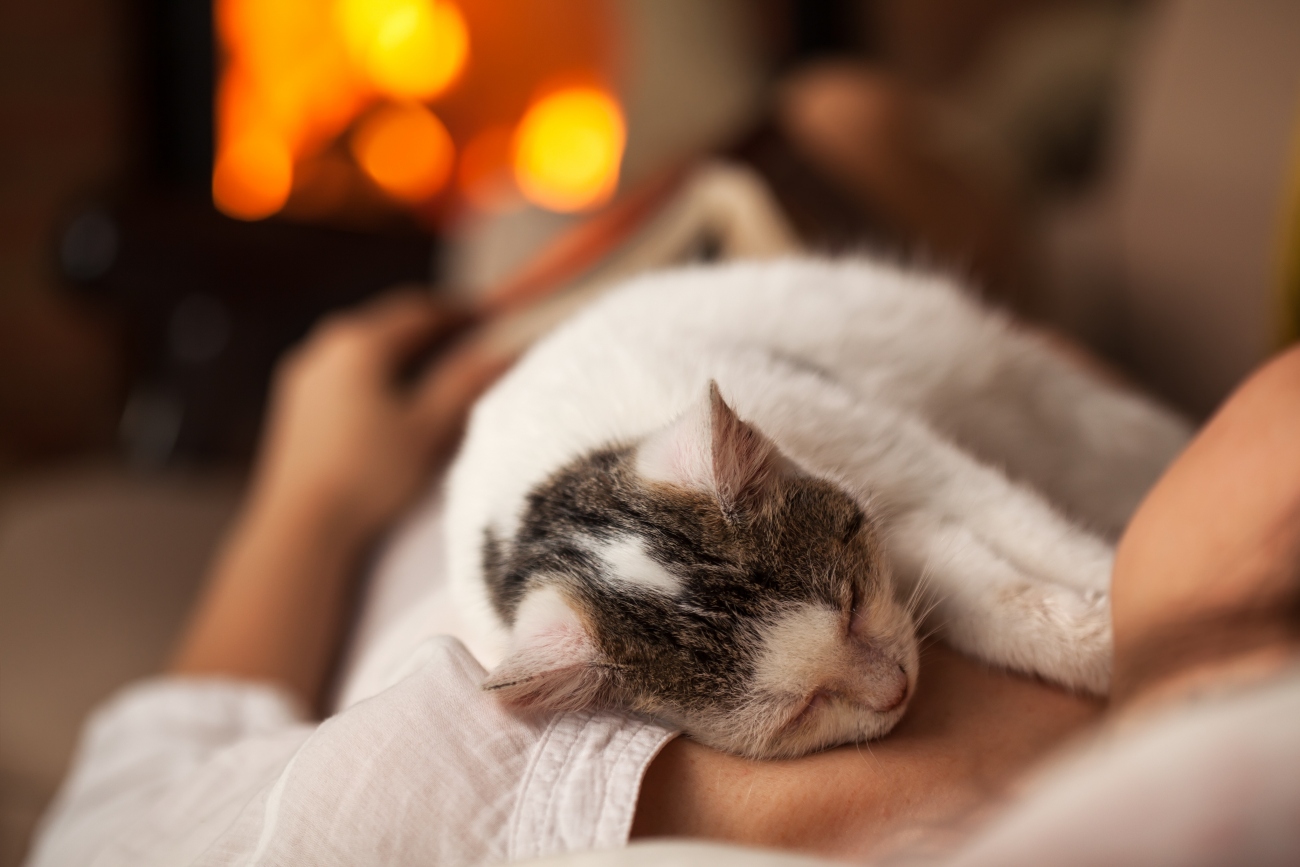
Chapter 4: Should I let my cat out at night?
Cats are naturally programmed to spend evenings and early mornings prowling around outside. So if you want to cohabit harmoniously, should you just let them do their own feline thing?
The Cats Protection charity advises against this, due to the increased risk of accident and injury.
As cats are less likely to be spotted at night, they could be more at risk from traffic accidents. Light-reflective collars (with quick-release fittings) can help, but it’s safer to keep your cat indoors until daylight.
Cats are also more likely to get into fights with other neighbourhood felines at night, while hunting and prowling across each other’s territories. Stray dogs can also injure your pet cat, and far more rarely, kittens could fall victim to wild animals such as foxes.
Pets are sometimes catnapped or injured by the most dangerous animals of all: humans. Pet-related crimes are more likely to occur at night, when owners are asleep.
If your furry friend is hurt, you are unlikely to notice its wounds until the morning. Get it to the vet as soon as possible – cat insurance can cover your pet for accidental injury up to a specified amount, depending on the cover level you choose. Better still, avoid the problem in the first place by keeping your feline indoors overnight.
Chapter 5: Encourage good sleep habits by getting into a routine
While your cat’s natural rhythm might be different from yours, that’s not to say that you can’t set a schedule.
Any parent of a (human) baby knows this is not necessarily an easy task, nor one that’s guaranteed to be a total success. But it will help hugely if your cat learns that it’s more likely to get what it wants if it asks at the right time.
You should begin setting a schedule when your pet is still a kitten: it’s more likely to pick it up quickly, accept it as normal, and adapt to it. But if you’re adopting an older cat, you can still teach it to abide by your household’s timetable.
So give it meals at the same time each day. Ideally, set a timetable for exercise, interactive play with you, grooming, petting – and sleep. That way, your cat will know what to expect – even if it grumbles about bedtime.
At night, keep your room dark, perhaps with blackout blinds. Your cat has better night vision than you, so even a small amount of light – perhaps from a smartphone – can send it the wrong signals. It needs to learn that for you, darkness means sleep.
If your moggy continues to want to play with you, ignore it! That’s the best way to teach it that night-time is a no-go.
Chapter 6: Make your cat tired by keeping it entertained during the day
One key thing to build into your daytime schedule is plenty of time together. That way, your feline friend gets the enrichment activities and snuggle time it needs – during the hours that you’re happy to provide them.
So if you work outside the home during the day, make sure you put aside some quality cat time in the evening. Play with your moggy, let it sit on your lap as you watch TV, and give it lots of petting.
This is also a good time to carry out basic grooming and pet care. Look out for signs of ticks and fleas, and contact your vet if you spot anything that worries you, such as cuts. Cat insurance may help you pay your vet fees.
Chapter 7: Enrich your cat’s life by getting it a companion
Talking of enrichment activities, the very best one is a fellow moggy to play with! However, there are a few drawbacks, too.
If you’re getting a kitten, consider buying two from the same litter. They’ll grow up together and be playmates for each other, particularly during those early, chaotic months.
If one is calmer than the other, there’s a good chance that the mellow habits will rub off on its sibling sooner or later.
Of course, if you’ve got one older cat and are thinking of introducing a second to the household, that’s a whole different ball game – and one that’s likely to disturb the balance of peace in your home, at least in the short term.
Read up on how to introduce cats to each other before bringing your new pet home. If there are ongoing problems, you should seek professional advice. With insurance for cats from Purely Pets, you get access to a 24-Hour Vet Helpline for all your concerns.
Remember to provide each cat with plenty of space, particularly for sleeping. Failure to do so is a recipe for nocturnal feline fighting – and a very disturbed night for you and your family.
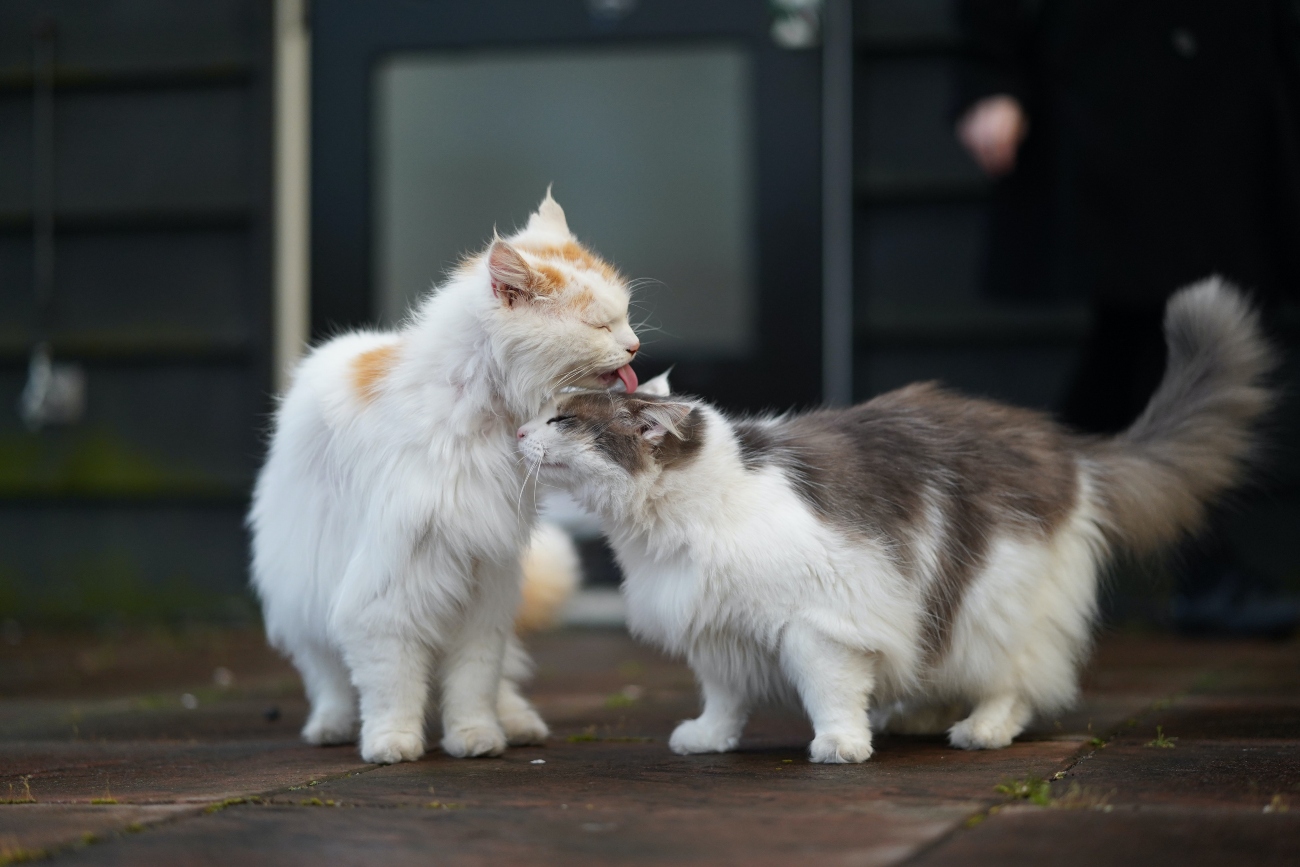
Chapter 8: Settle your cat’s stomach by changing its meal habits
Meals are an important part of your cat’s daily schedule, so try to stick to regular times.
If your cat still seems restless, consider whether it’s getting enough to eat. Try adding a high-protein snack at bedtime: this will both fill its stomach, and send it an important cue that you’re about to finish your day.
When your cat wakes you in the morning demanding to be fed, resist! If you get up and feed it straight away, it will learn that this is an effective technique to wake you. If it knows that you will turn over and go back to sleep, there’s a better chance that it will learn to settle down and wait until its set breakfast time.
Once you do get up, don’t make feeding your cat the first thing you do. Have a shower and pour yourself a coffee first, so that your cat learns to be patient.
Alternatively, you could invest in an automatic feeder and set it for the same time each morning. Your cat will soon start hanging around its feeder waiting to pounce, leaving you alone to slumber peacefully.
If your cat suddenly seems to be eating less or more than usual, or gaining or losing weight, you should speak to your vet about your concerns. Purely Pets cat insurance can help to cover the cost of vet visits.
Chapter 9: Keep your cat content by creating a cosy sleeping space
Some owners can cope with a certain amount of disturbance during the night: say, a cat leaping up onto the bed for a snuggle. They simply fall back to sleep straight away with minimal disruption.
But others are more prone to insomnia: if they’re woken in the night, they won’t get back to sleep. Cue one very groggy owner and one highly confused cat, who won’t understand why you’re less playful than usual!
Even sleeping cats make small sounds which can disturb an insomniac owner. They’re thought to dream (of hunting, playing, or snuggling up to you) and even have nightmares. It’s all perfectly natural – but potentially quite disruptive.
So if you fall into the insomniac camp, you’ll need to take decisive action at night. Sadly, your vision of having a cat curled up at your feet as you both slumber peacefully is probably not going to become a reality. Instead, you need to accept that separate sleeping quarters are best for both of you.
That means creating a calm sleeping environment for your cat that’s not in your own bedroom. Ideally, you’ll want two doors between you and your beloved pet, to prevent it scratching on your bedroom door and waking you that way.
Choose a quiet room or corner to set up your cat camp. Cats love to alternate sleeping places: it’s thought this stems from being in the wild, and needing to avoid detection to stay safe. So it’s best to provide multiple comfy places to choose from, including a couple that are higher up.
Make sure your pet has access to water and a litter tray throughout the night, as well as a scratching post.
And, given that there’s little chance of your moggy snoozing the entire night away, include some toys to keep it entertained, too. Puzzle toys are a good option, as they tend to be quiet. Now’s probably not the time to let your cat play with squeaky toy mice!
Once all that’s done, close your bedroom door firmly, and go to sleep. Don’t feel bad about it – your cat will probably settle, and it’s best for both of you.
But do look out for signs of stress that indicate your cat is not adapting to this new routine. These could include toileting outside the litter tray, fighting with other pets if you have them, hiding during the daytime, or behaving irritably with you. It could also demonstrate its displeasure or anxiety through body language such as raised fur or flattened ears.
If you have any concerns, visit your vet to talk them through – your Purely Pets cat insurance may cover the cost of fees once your policy has in force for a minimum of 24 months, with excess starting from £60.
Chapter 10: Let your pet outside safely with a cat flap or catio
While you might be reluctant to pander to your pussycat’s wish to prowl its territory at night, it’s possible to allow it a little leeway.
By installing a timed cat flap, you can let your moggy go out on an early night-time stroll. When it’s ready to come in for a snooze after a few hours, it can enter through the cat flap – which then automatically locks behind it for the rest of the night. You’ll already be sound asleep by this stage.
As mentioned in Chapter 4, your feline friend is at increased risk at night. But you might feel this is a risk worth taking to allow your cat to behave according to its natural nocturnal rhythms, while letting you get some vital shut-eye. After all, compromise is everything!
Alternatively, you could install a catio: an outside enclosure, often accessed through a cat flap. So your cat gets fresh air, night-time sounds and smells, and a place to go to the toilet, while remaining protected at all times. If you’ve got the garden space to go for this option, it could well be your route to a more peaceful night’s sleep.
However, make sure it’s secure enough that your cat can’t escape. And be warned: if other cats come up to the outside of the enclosure, you could end up being roused by caterwauling anyway!
While a catio will protect your feline friend from most dangers, it won’t do much to keep it warm during the colder months. Your cat insurance should help cover you for a trip to the vet’s for hypothermia treatment, but this really is something you want to avoid! Keep your cat snuggled up inside in the warm during the winter.
Chapter 11: Top tips for a peaceful night’s sleep for you and your moggy
- Invest in ear plugs. These will block out many quieter sounds – though a determined cat will still be able to wake you.
- Attach a scratch mat onto your door. If you keep your cat outside your bedroom, it may scratch to be let in. By fixing a scratch mat vertically to the lower panel, you can protect your door.
- Try playing white noise. This can mask the minor sounds that your cat might make at night, helping you sleep more soundly.
- Trim your cat’s nails. That way, it won’t hurt you if it pounces on you in the night – though it might still wake you.
- Take special precautions round New Year’s Eve and Fireworks Night. Loud, sudden noises are likely to alarm your cat, and could even lead it to bolt. Keep it inside, calm and safe, after dark.
Get a quote from Purely Pets
Do you have any top tips you’d like to share, or any comments you’d like to add? We’d love to hear from you.
Find out more about our cat insurance policy now. We offer 15 levels of lifetime cover, with no upper age limit. We’ve got an Excellent Trustpilot rating, too.
Get a quote today.
Frequently asked questions
Why does my cat purposely wake me up at night?
Cats are naturally nocturnal creatures, which means they're most active during the night. They may want to play, hunt, or seek your attention when their energy levels are at their peak.
Also, if your feline friend is suddenly waking you up when it didn't before, it could be a sign of a medical issue. Before you curse your cat's midnight antics, remember they're just following their instinct or might be in need of a little extra care.
Why does my cat meow in the middle of the night?
Your cat might be feeling hungry or thirsty, or maybe they're just bored and want your attention. Cats are more active when we're trying to sleep.
While it might be a tad frustrating, remember that your cat isn't doing this to annoy you. They're just following their instinctive behaviours or trying to communicate with you.
Is it cruel to lock cats out at night?
While cats are nocturnal, locking them out at night could expose them to various dangers, such as traffic, adverse weather conditions, and potential predators. Moreover, cats are territorial creatures and being left outside could cause them stress.
So, according to many animal welfare organisations and experts, it is indeed cruel and unsafe to leave your feline friends outside during the night. It's always best to ensure they have a safe, warm place to rest indoors.
Helpful Pages
Recent Posts

How to care for your pet in winter
26/11/25Pet Insurance Quote
- 98% claims paid *
- Claims paid directly to vets
- 24/7 vet video consultations
- Interest free monthly payments
